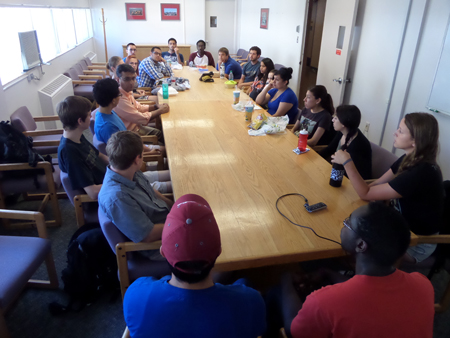WSU Horticulturist Dhingra Planting the Seeds for Undergraduate Research

MEDIA CONTACT: Jared Brickman, Communications Assistant, Office of Undergraduate Education at WSU, 509-335-8070, UCHCCommMar.4@wsu.edu
SOURCE: Amit Dhingra, Associate Professor, Department of Horticulture, 509-335-3625, adhingra@wsu.edu
PULLMAN, Wash. — From savoring the distinctive, flavorful crunch of an apple to eyeing the plump, crimson cherries adorning mouth-watering summer produce displays, people love fruit. But few perhaps know fruit like Washington State University horticulturist Amit Dhingra, who looks beyond the pits and leaves into the genome of these sweet treats.
“A genome is kind of like the map to a city,” says Dhingra, an associate scientist and professor in the Department of Horticulture in the College of Agricultural, Human, and Natural Resource Sciences at WSU. “If you need to buy a book, you use the map to find a bookstore. If you need to find which gene will protect a plant from a virus or make it more efficient at using nutrients, you use the genome.”
Dhingra’s journey to WSU started as early as the eighth grade when he learned about the simple, life-sustaining process of photosynthesis.
“We were studying all these things and I, still a kid, wondered why people weren’t learning more about plants,” Dhingra recalls. “They created oxygen – supported life.”
As a result, Dhingra followed his passion for plants until he mastered the process of mapping a genome in order to solve problems. And while he says this makes him feel like “he’s never worked a day in his life,” his eyes truly light up when talking about another facet of his work: mentoring undergraduates.
“They keep me sane, I think,” he says through a chuckle. “They have this unstoppable momentum. That’s why I really love bringing them into my lab, regardless of their major or discipline or their views on science.”
Proof for his enthusiasm for undergraduates is his work during the summer with the Research Experiences for Undergraduate (REU) program, sponsored by the National Science Foundation. He has been a PI on projects in the program since (2011).
This May, eight undergraduates from schools around the country arrived in Pullman and the WSU extension office in Wenatchee to participate in an REU focused on plant genomics and biotechnology led by Dhingra.
Unique to this year’s REU is the opportunity for two students to work with the WSU extension office in Wenatchee.
“They’re not just in labs,” says Dhingra. “They actually get to be out there in the field and collaborate with farmers, which is very rewarding.”
One student there is researching fire blight resistance in apples with Kate Evans, associate professor of pome fruit breeding at the Wenatchee extension. Fire blight is a blackened lesion on fruit plants like pears and apples caused by bacteria. Under the right conditions, fire blight can decimate an orchard, making it a major concern for farmers.
The other project in Wenatchee is in the lab of Lee Kalcsits, assistant professor of tree fruit physiology. The lab is tracking which breeds of plants are more efficient at using water. Since restrictions on agricultural water use are of concern in the region, this is another project where the results will be useful to farmers right away, says Dhingra.
 Back in Pullman, he mentors a pair of students. One is working on understanding the genes involved during cherry harvest – the actual disconnection from the stems. The eventual goal is to use this knowledge in an ongoing labor conservation project that could pave the way for mechanized harvesting. His other mentee is engineering camelina, an oilseed crop, for jet fuel.
Back in Pullman, he mentors a pair of students. One is working on understanding the genes involved during cherry harvest – the actual disconnection from the stems. The eventual goal is to use this knowledge in an ongoing labor conservation project that could pave the way for mechanized harvesting. His other mentee is engineering camelina, an oilseed crop, for jet fuel.
Working on a subject closer to home, one student in associate professor of crop sciences Ian Burke’s lab is tracking the diversity of weeds in fields around the Palouse. Again, this research relates directly to farmers with a more hands-on approach.
“There’s a lot of diversity in the programs,” says Dhingra. “However, we’re not interested in contrived modules of study where the students just come and go. We want them involved in something that’s real, ongoing and relevant.”
That fit into ongoing research is made possible through mentored research. Each of the REU students has a WSU faculty member mentoring their work. Graduates and Post-docs are also involved, creating a research team-style environment.
Dhingra prefers this kind of learning environment to the classroom and says the REU offers undergraduates a multiplicity of opportunities to grow.
“You see it in both their personal and professional lives,” says Dhingra. “During the summer at WSU they make lifelong friendships and are living far from home. They get a softer introduction to science, and many are invited back.”
The culminating goal is to inspire young researchers and encourage them to think about the possibility of graduate school, including programs at WSU.
Ultimately, Dhingra encourages all of his students to “think big and have fun” with research.